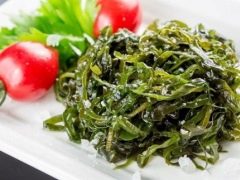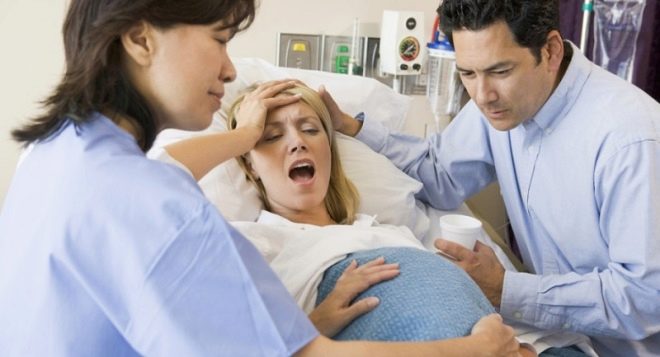Sea cabbage during pregnancy: properties, rules of use and use
Everyone knows about the many beneficial properties of seaweed. Not everyone loves her for her specific taste and smell, but those who like them cannot resist the temptation to eat kelp. It can be especially useful during pregnancy. In this article we will talk about whether sea cabbage is allowed for pregnant women, how to do it properly and what else kelp may be useful for the expectant mother.
What it is?
The scientific name for seaweed is laminaria (Laminaria). By origin, it is algae that are directly related to the class of brown. Laminaria are different types. Japanese grows in the Sea of Japan and the Sea of Okhotsk, sugary, most often used in cooking, grows in the White and Kara Seas. In their natural habitat, the laminaria form extensive impassable thickets where there is a constant intensive current, mainly along the coast. Therefore, it is not surprising that they collect algae after the last storm.
The first came up with the use of such a "catch" the Japanese. They were quite surprised to find a lot of useful properties of algae, cast ashore. In Russia, algae was discovered in the 18th century. The product was described by the participants of the Bering expedition.
In amazing algae contains a large amount of mineral compounds and vitamins. The main advantage of the product is a record iodine content, necessary for the normal functioning of the thyroid gland and metabolic processes. In addition, laminaria contains ashes, vitamin PP, beta-carotene, vitamin A, vitamins B1, B2, B6, B9, as well as vitamin C. The product is rich in potassium, magnesium, sodium and calcium. There is in it phosphorus, iron.
Benefits for pregnant women
Sea kale during pregnancy can be used in food, but, naturally, in reasonable quantities, since an overdose of iodine is quite dangerous for human health. If you have it without fanaticism, then the benefits of the product will not take long to wait.
First of all, it is a source of valuable dietary fiber. Laminaria has the ability to collect moisture, and therefore in the stomach and intestines, it slightly increases in volume. The intestinal walls begin to irritate at the level of the mucous membrane, and this is what helps normalize peristalsis. As a result, increased flatulence and constipation, which often plague expectant mothers, retreat.
A large amount of iodine not only supports the thyroid gland, but contributes to the prevention of vascular diseases. The state of the blood vessels of the future mother will be taken care of by another useful substance - lecithin. Due to the presence of fatty acids, the product copes with the removal of toxins from the body.
Iron in the composition of kelp helps to increase the level of hemoglobin, which is very important for a woman “in an interesting position”. Doctors in ancient China fed seaweed pregnant and parturient women, sincerely believing that this product improves the quality and quantity of breast milk.
Thus, sea cabbage during the carrying of a baby can be eaten at least because this product:
- promotes softer and more delicate digestion;
- compensates for iron and iodine deficiency in the body;
- removes toxins, the impact of which in the modern world, alas, is inevitable;
- normalizes metabolism;
- helps to restore water-salt metabolism;
- gently protects blood vessels from sclerosis and blood clots;
- prevents constipation;
- compensates for calcium deficiency, contributes to the development of the fetal bone skeleton and the hemostatic process of the mother and fetus (especially important in the 1st and 2nd trimester);
- boosts immunity;
- normalizes blood pressure;
- reduces the likelihood of spontaneous miscarriage in 1 trimester due to the increased content of folic acid;
- has a beneficial effect on the nervous system of the woman (due to magnesium);
- It helps to control your own weight and will be an excellent dish for those who need to eliminate the pathological increase in body weight while carrying a child.
Who is contraindicated?
Laminaria is useful, but for all its merits during pregnancy, there are also contraindications for eating such algae. It can cause harm to women who are prone to allergic reactions, especially to seafood. And iodine itself is quite a strong allergen, you should not forget about it.
Doctors indicate that you should not get involved in the seaweed during the baby’s birth for women who have had hemorrhoids even before conception or have manifested themselves after the onset of pregnancy. Also from the dishes with algae should be abandoned women who have in the process of carrying the baby exacerbated chronic diseases of the stomach and pancreas. In remission, you can eat it, but in the acute period you cannot. With kidney problems also do not eat sea kale.
If a woman has revealed excessive functioning of the thyroid gland with an increased production of thyroid-stimulating hormones, then neither iodine preparations, nor sea cabbage can be consumed.
Temporarily, future mothers are advised not to eat sea kale if a runny nose has worsened or signs of cystitis have appeared.
Also, we must not forget that harm can not so much seaweed itself, as the conditions of its growth and collection. Brown algae absorb liquids, and this we have already learned. They also absorb harmful liquids, especially if there, where they grow, there are environmentally unfavorable factors (it is unlikely that a seaweed from the coast with contaminated radiation from Japanese Fukushima would be useful to the future mother and her baby).
Spill of petroleum products in the sea, radiation, chemicals - all of this immediately affects the composition of the product, and therefore you need to choose and buy only the "right cabbage". How to do this, we describe below.
Using
Laminaria used by pregnant women in several directions.
In gynecology
Thin sticks of dried kelp - a means for generostimulation. They are used if, by the end of the pregnancy, the woman has an immature cervix or the pregnancy is already post-term. The doctor sticks the doctor into the cervical canal of the cervix and leaves it for several hours. Laminaria swell and begin to mechanically expand the cervical canal from the inside, contributing to softening of the cervix and its early opening.
The use of such rods causes a lot of controversy among doctors. According to some information, kelp increases the likelihood of infection of the uterus after delivery, their action is quite painful for the parturient, and the desired effect is not always achieved. Therefore, some obstetricians consider its use as unjustified and inexpedient, and some very much like to introduce kelp in pregnant women who cannot start giving birth, and are very pleased with the results. Opinions of women in labor are also ambiguous.
In food
Sea kale may be available in different types. A woman can buy frozen algae. Then they must be defrosted and rinsed very thoroughly. Dried seaweed is pre-soaked in clean water for 12-14 hours. From the resulting product is prepared salad, add to fish soup, enter into the composition of garnishes.
But pickled cabbage, preserved in vinegar, it is better not to buy. Preservatives, sugar and supplements will not benefit a pregnant woman, as well as ready-made kelp store salads.
Daily allowance of seaweed for pregnant women - from 30 to 100 grams, not more.
In cosmetology
Soaked dry or thawed algae can be used to make homemade masks for the face and hands. Gruel of them - an excellent anti-inflammatory local remedy for wounds, scratches and cuts.
Selection rules
Do not be shy, feel free to ask the representative of the store certificate of quality for sea kale. This is important in order to understand where the product is assembled and packaged. Please note that the laminaria collected around Japan is undesirable until all the consequences of the accident at the Fukushima nuclear power plant are eliminated. With a light heart, choose Chinese products, Far Eastern kelp. The product from the Barents Sea is also not worth buying yet - environmentalists pay attention to its heavy pollution.
The package must be transparent, the label should not contain such additives as E220, E621. Cabbage should not be yellow.
If you can add a little potato starch to the purchased product, it will help to determine the fake - the real kelp will turn blue. Falsification will remain unchanged.
On how to eat during pregnancy, see the following video.




















